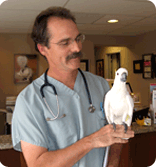Amazon with Hyperlipidemia - HELP!

Hello, My 18 year old Blue-fronted Amazon has been quite ill. She looked “odd” and had trouble balancing. She has always been very healthy, not overweight like a lot of Amazons are and in excellent feather. She has been on a mostly seed diet with several fresh green and yellow/red fruits and veggies daily. She has also been in season (very strongly) since late February. Normally, her “spring seasons” don’t last this long. I took her to a large veterinary hospital immediately when I noticed the balance problem. Her regular avian vet had retired last year and since she has always been healthy, I hadn’t looked around for another. Anyway, she had seemed fine the day before. The vet who examined her (a board certified avian vet) said she looked great, wasn’t too fat or too thin and had beautiful feathering (already knew that).
She was admitted to the hospital because of the symptoms and to run a battery of tests. The vet called me a few hours later after taking blood. They found there was more fat in her blood than red blood cells! It was so bad they had to send the blood out for a CBC and chem panel (normally they can do these tests on site). She was started on gemfibrozil and niacin to reduce the fat in her blood, given a shot (I don’t know what) to bring her out of season and sent her home with me last weekend after two days in the hospital. She was very stressed from being in the hospital. The medicines made her sick (vomited a minute or so after giving them) so I stopped giving them after a few days. She is eating but losing a lot of weight. I don’t see much improvement in her balance but she is vocalizing normally and playing with her toys. The vet wants to switch her to an all pellet diet but to start it gradually. I have always offered some pellets but she has never liked them (my other birds, both citron cockatoos, eat them). I know this group doesn’t offer medical advice but I was wondering if anyone has dealt with this problem (hyperlipidemia) brought on by being in season and what the outcome was? The vet said this could very well be fatal. Do you think fish oil would help? Flax oil? Any suggestions? While we have another appointment with this vet on Monday afternoon, I have a feeling there will just be more of the standard drugs and pellets prescription that clearly isn’t working. I love this bird very much. She is the sweetest bird ever and tells me she loves me all the time. Please help!

Lots to say here in general, although specifics pertinent to your bird cannot be applied, of course. Hyperlipidemia is quite common in Amazon parrots, most frequently when there is overnutrition (fatty or calorie dense foods), or when combined with estrogenic hormonal activity. Frequently, there will be fatty liver disease, with significant liver dysfunction involved. In this light, the finding of the symptom of hyperlipidemia is valid, and suggestive strongly of a need for change. This in your bird includes an absolute need to change the diet to a low energy diet (even though you say your bird will not eat a pelletized diet - there is a need to change), and behavioral modification to control and eliminate reproductive drive issues. Birds do not “come into season” as mammals do, and realistically respond with increases or decreased in reproductive drive in response to environmental ques. These include but are not limited to the perceived presence of a pair bonded mate, the perception of a nesting site, the perception that there are nutritional conditions of abundance, the presence of a high-calorie diet, etc. I would presume that the injection given was a counter-hormonal treatment to try to help stop oestrogenic activities in your bird - but the real fix comes from a combination of dietary and behaivoral modifications. The other very very very real risk to consider here would be that your bird can also have cardiovascular disease - yet another disease linked to fatty foods, inactivity and hyperlipidemia. A lack of balance and coordination, combined with weight loss is not uncommonly seen in Amazon parrots suffering with Athlerosclerosis. Fish oils should not realistically help your bird at present time in and of themselves. What you really need is a bit more accurate of a diagnosis in which to apply a balanced combination of behavioral guidance, nutritional modification and chemotherapeutic intervention. Flax oils also should not realistically help your bird at present time in and of themselves. What you really need is a bit more accurate of a diagnosis in which to apply a balanced combination of behavioral guidance, nutritional modification and chemotherapeutic intervention. A “standard set of drugs and pellets prescription” also should not realistically help your bird at present time in and of themselves. What you really need is a bit more accurate of a diagnosis in which to apply a balanced combination of behavioral guidance, nutritional modification and chemotherapeutic intervention. I wish you the best of fortune in sorting out your bird’s problem a bit more accurately and formulating the needed lifestyle changes that she needs, Brian Speer, DVM. Diplomate, ABVP, Diplomate, ECAMS.

































